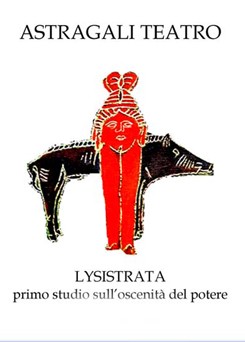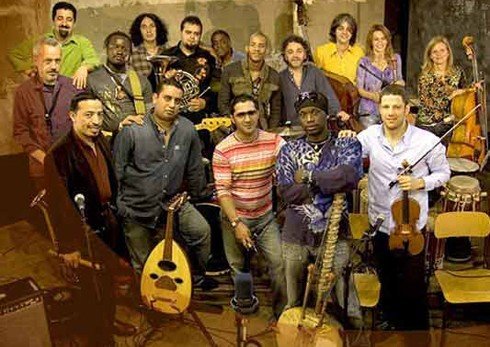 Frontiers, conflicts, Mediterranean. This is the leading thread of Roads and desires- theatre overcomes frontiers, the international theatre research project realised last year by the Astràgali Company from Lecce.
Frontiers, conflicts, Mediterranean. This is the leading thread of Roads and desires- theatre overcomes frontiers, the international theatre research project realised last year by the Astràgali Company from Lecce.
Being involved in the major themes that the region is going through such as identity construction, the denial of the right to mobility and war, Astràgali offers a reflection on frontiers as places of conflict and lack of recognition.
Roads and desires emerged from the idea of frontiers as limes of identity, places of introspection and confrontation/ clash with the other, a scar that never healed which rips the Mediterranean with endless conflicts and important divisions. Organised between Europe and the Near East, the project has involved theatres, artists and universities in Italy, Palestine, Jordan, Greece, Cyprus, Great Britain, France and Spain.
The work revolves around three international artistic residencies with young students and stage actors taking place in Ammam in the villages of Sebastiya, Aasyra and Nasfjibil near Nablus and in Lecce (Italy).
We have met the young actors participating at the artist residency that took place in Salento from the 28th July to the 10th of August on the occasion of the presentation of
Roads and desires - appunti di viaggio di un teatro in Palestina (travel notes of a theatre in Palestine), the documentary realised by Fabio Tolledi, director of Astràgali.
Mohannad is one of them. With big and curious eyes and a generous smile, this twenty-seven-year-old young boy prefers poetry to terrorism, and the universal language of art to armed resistance. "I was born in Jordan from parents who had run away from Hebron in 1967. All my family is politically involved in the Palestinian question", he says, "and my father has transmitted to us a great love for theatre as an instrument of mobilization and of social and political struggle". Initially, in Palestine, resistance was only intellectual. When Israel became aware of the power of culture as an instrument of denunciation and struggle, it started to fight against it. It tried to cancel any trace of it, destructing theatres and closing cultural centres that were active in the country back then.
Today, artists that are engaged in the Palestinian question are still not allowed to work in the Territories. This is why the presence of Astràgali in Jordan and Palestine and the work carried out are so precious. They have rekindled hope. When I watched their performance Lysistrata, primo studio sull'oscenità del potere, (Lysistrata, first studio on the obscenities of power) in Amman, my first reaction was shock. In this work, comedy intertwined with the obscene, power with war and violence. The female body is at the centre of this performance as a place of pleasure denied to man hoping to put an end to armed conflict.
Jordan society refuses to talk about these things and denies the display of pleasure and nudity. I was surprised that in spite of the normal resistances, the audience decided to stay and face these themes. In our country, behind a seemingly open and democratic facade hides an Islamic country that refuses any irreligious element. There is much censorship on an intellectual level. In this context, it has been important to talk about the atrocity of war and the power that women can take on in conflict resolution: the biggest denial of human desire."
Marah is hardly twenty years old and studies English Literature at the University of Nablus.
Her enormous black luminous eyes are framed by a coloured veil. After having participated to the theatre residency organised by Astràgali in
Sebastiya, she decided to come to Italy to continue working with them. Together with her colleagues, she took part in the new edition of
Lysistrata that resulted from the ten-day workshop. "For me this was the first experience in a theatre professional context and it was absolutely the first performance," she states. "In Palestine, I was struck by the really intense working method proposed by Fabio (Tolledi, ndr), and by the use of breathing as a tool helping to go deeper into the body. In the beginning I had a lot of difficulties working on the theme of pleasure and nudity: I was embarrassed and I thought that I would never manage to go on. Then I understood that the idea was not to shock anyone but to work on the artistic image in a new way. In Islam it is thought that the woman should cover her own body not because showing it would be sinful but because the idea is not to put desire at the first place in interpersonal relationships. Nowadays, this teaching is linked to shame. Using all the parts of my body during drama work gave me my self-confidence back".
Shereen is twenty-two years old and she was born and brought up in Jordan. "The most important thing for me was facing the theme of the body and femininity", she says. "I am a young Arab woman who lives in an Arab country and I felt the weight of cultural conditioning on my education since I was a child. In our country, women are required to conform to the role model imposed by society and they respond to this call. It's like a cage and they end up paralyzed in this pattern."
Omar is a young twenty-nine year old Palestinian. He believes that art is concrete resistance. "I was arrested by the Israeli services several times and my brother is a martyr. In spite of all this, I'm not interested in violent resistance but in art as an instrument of struggle and mobilization. I was touched by the work with Astràgali in Palestine, by the sensibility shown towards the Israeli occupation. It was easy for me to open up to this experience and decide to come to Italy: I had faith in their way of doing drama. At the workshop in Lecce, I learned how a very small element buried in memory, comes out again, sometimes in a deep and involving process that can be transformed into art. The faith in this allowed me to overcome all borders..."
The work on memory was the leading thread of the theatre residency that was held in Salento. The participants were asked to share a memory related to laughter and another related to horror and disgust. The images that emerged during the training were re-elaboration in group-work and gave birth to choral actions inserted in the plot of Lysistrata that was presented in a new version at the Roman Theatre in Lecce on the 6th of August.
"The intrigue and the elaboration of each one's memory with the one of the others was a very important element for the construction of the collective theatrical actions", explains Roberta from the Astràgali Company.
"Through the theme of memory we dealt with the theme of desire working on body experience in the drama training. In the Lysistrata, the closing of men's war through the negation of the body allows women to claim their own physique as a place of desire. And the comic element manages to subvert the vision of things and of the world overturning their order. Femininity as a principle of movement and radical resistance disrupts the stereotype of masculinity."
Lysistrata, "the one who dissolved the army" is the one who put an end to the bloody Pelopponese war by persuading all Greek women to join the sex strike.
In a matrilineal, uterine intrigue, the rewriting of Aristophanes' classic proposed by Fabio Tolledi and Benedetta Zaccarello, philosopher and researcher, offers a feminine plot centred on the urgency of one's acceptance of the other. In the carnality of human experience, Lysistrata emerges as a laugh that transfigures everything, unmasking the senselessness of violence and war.
In the new Lysistrata, Astràgali and the young artists met along the way tell their own collective experience resulting from the plurality of stories and memories. An intercultural encounter in which each and every one of them has exposed himself in the plough of a living and 'resistential' theatre. A theatre made of ways and desires.(ÇT)





